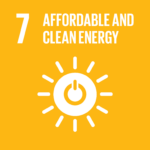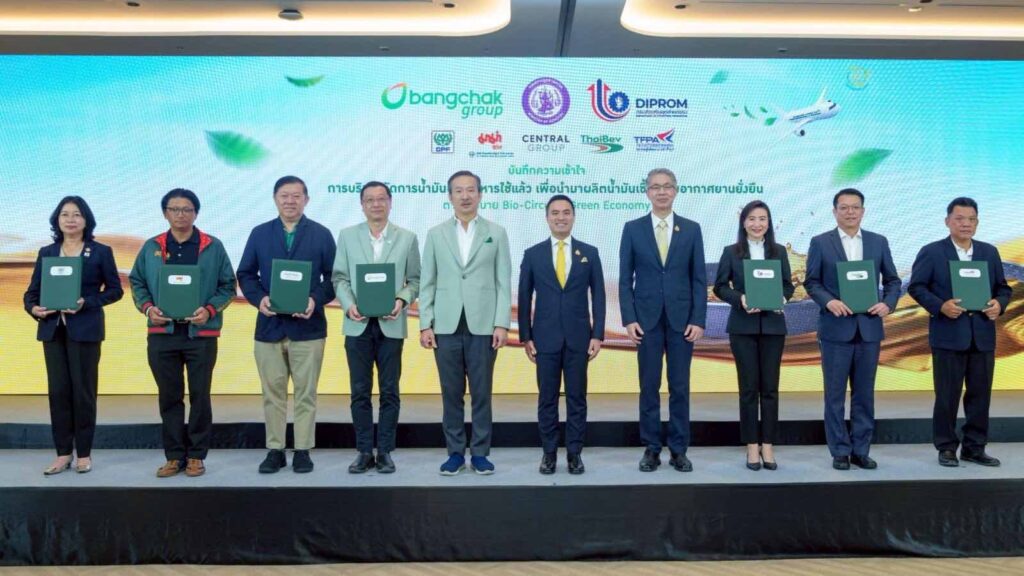Partnership with top Thai companies targets used cooking oil for aviation fuel, aiming to cut emissions and boost energy security.
BANGKOK — In a decisive move to decarbonize its aviation sector and strengthen its renewable energy portfolio, Thailand has launched a public-private initiative to develop a nationwide sustainable aviation fuel (SAF) supply chain. The effort is being spearheaded by the Ministry of Industry (MOI) in collaboration with six leading Thai corporations, with a focus on converting waste cooking oil (UCO) into aviation-grade biofuel.
The collaboration, marked by the signing of a memorandum of understanding (MoU) on March 31, is seen as a pivotal step in positioning Thailand as a regional leader in green aviation and a clean energy hub. It aligns with the government’s Bio-Circular-Green (BCG) economic strategy, which emphasizes sustainable industrial practices and circular resource use.
RELEVANT SUSTAINABLE GOALS



Turning Waste into Lift-Off: UCO as Key SAF Feedstock
The six corporate partners — Central Group, Thai Beverage, Charoen Pokphand Foods, Thai President Foods, the Thai Food Processors Association, and Bangchak Corporation — are all major contributors to Thailand’s food and service sectors, producing significant quantities of used cooking oil.
By leveraging this readily available waste as feedstock, the initiative aims to lower SAF production costs and address supply constraints — key barriers to scaling green fuel alternatives. SAF made from UCO not only reduces lifecycle carbon emissions compared to conventional jet fuel but also tackles industrial waste management in a sustainable way.
Minister of Industry Akanat Promphan said the partnership underscores Thailand’s ambition to become a key economic and aviation player in the region under the leadership of Prime Minister Paetongtarn Shinawatra. “This MoU marks the beginning of comprehensive public-private integration that will benefit the nation across economic, environmental, and social dimensions,” he said.
Bangchak to Power SAF Production at Scale
A central player in the initiative, Bangchak Corporation is preparing to launch Thailand’s first commercial-scale SAF production facility in Bangkok by the second quarter of 2025. The plant is expected to produce up to 1 million litres of 100% Neat SAF daily, certified by the International Sustainability and Carbon Certification (ISCC).
Bangchak CEO Chaiwat Kovavisarach emphasized the importance of expanding feedstock diversity beyond UCO and establishing national SAF usage mandates. He called on the government to implement blending targets and investment incentives to support the long-term growth of Thailand’s SAF ecosystem.
“These steps are essential to building investor confidence, attracting long-term investment, and reinforcing Thailand’s leadership in clean aviation fuel within the region,” Chaiwat said.
The Department of Industrial Promotion (DIPROM), under the Ministry of Industry, is leading efforts to coordinate between stakeholders, assess feedstock availability, and design the regulatory framework to support SAF production.
Ms Natthinya Netyasupha, Director-General of DIPROM, said the initiative also seeks to build supply chain networks and raise public awareness through education campaigns. A long-term vision includes integrating household-level UCO collection to create a resilient and inclusive circular economy model.
Dr Nattapol Rangsitpol, Permanent Secretary of the Ministry, reaffirmed that the SAF program supports the Ministry’s “Fighting, Saving, Creating” policy, which focuses on waste management reform, SME competitiveness, and green industry development.
Regional Impact and Global Relevance
Thailand’s SAF push comes as global aviation faces increasing pressure to reduce emissions in line with international climate goals. The initiative not only supports domestic carbon neutrality targets but also enhances Thailand’s competitiveness in global trade, particularly for sectors like tourism, food exports, and aviation.
Early interest from major international buyers — including Shell Eastern Trading in Singapore and Cosmo Oil in Japan — signals confidence in Thailand’s emerging SAF industry. With clear government backing, private sector muscle, and a strong policy foundation, the country is poised to become a trailblazer in Asia’s clean aviation journey.
As climate change intensifies and global demand for green fuel rises, Thailand’s SAF initiative demonstrates how targeted collaboration, waste valorization, and policy reform can work in tandem to drive sustainable innovation. While challenges remain — including regulatory clarity and feedstock diversification — the runway has been cleared for a cleaner, greener future in the skies above Southeast Asia.
You may also be interested in :
Noovoleum Secures $3M Investment To Advance Used Cooking Oil Recycling in Indonesia




